- Home
- Jon McGregor
If Nobody Speaks of Remarkable Things Page 4
If Nobody Speaks of Remarkable Things Read online
Page 4
I dialled the number again, and it was engaged.
I don’t think I knew what I was going to say. I don’t know why I thought I’d find it any easier to tell her than Sarah.
I think I thought that, once I’d managed to say it, she’d at least be the one who would be able to help.
I think I hoped there would be shock and tearful reaction, that then she’d offer practical help and sensible advice.
That maybe she’d say why don’t you come and stay for a few days and we’ll talk it through, you and me and your dad.
Like a family, like a proper family.
I don’t know why I thought these things, I don’t know why I thought anything would be any different suddenly.
Perhaps I thought that exceptional circumstances could change the way of things.
I sat there, listening to the engaged tone, trying to think of the right words.
Telephone conversations with my mother are never very easy.
There always seems to be a weighting inside them, things left unspoken, things not fully spoken.
She says things gently and discreetly, carefully holding back her full implication.
Like holding playing cards against her chest.
When I told her about my latest new job she said that sounds very nice and what other opportunities have you been looking at?
She says things like, I don’t think you’re making full use of your degree, my love.
She says things like, it doesn’t sound as though you’re stretching yourself.
She doesn’t say what the hell kind of a job is that, or what are you actually doing with your life here?
I wonder if I wish she would.
I got through eventually.
My dad answered, he picked up the phone and sighed and said yes, please?
He’s always answered the phone like that, as though he was afraid of who might be trying to speak to him, of what they might be intending to say.
I said hi dad it’s me, is mum there, and he said no, no she’s not, she’s gone out tonight.
I’m not sure whether I was disappointed or relieved.
I could hear him clutching the phone tightly, holding it away from his face as though he didn’t think it was entirely safe, the way he always does, and I knew that I wouldn’t say anything to him.
I knew it was a secret I would be keeping to myself a little longer.
He asked me about my job, he asked me about people I haven’t seen for a long time and I said they were fine.
I said something about football, and then I let him get back to watching the television.
I put the phone down and imagined what I might have said, mum there’s something I have to say, or mum I need to talk to you about something.
Mum I’m not sure how to say this but.
I think I was hoping she might realise something was wrong without me having to say so, that I could talk about my new shoes and she would say so what is it you’re really telling me?
Like the mum in the old British Telecom adverts.
I looked at another photograph, of Simon and Rob and Jamie dancing naked down the street in the first pale hours of that summer, celebrating the election.
I remembered that momentous night, looping a cable through the window and setting the TV up in the front garden, gathering around it with pizza and weed and the excitement of history.
I remembered coming back from the garage at midnight, armed with fresh snack supplies and seeing my friends’ faces lit up by the shrine of the television.
Shining and blue and flickering in the darkness.
Already looking like ghosts.
Chapter 6
The woman at number nineteen, she has finished hanging out her washing, and now she steps into her kitchen and begins to think about breakfast. The children will be waking soon, and the whole household will begin then to fumble into the morning, her husband, her husband’s father, her husband’s mother. She reaches up to the cupboard over the sink and fetches down boxes of cereal, four packets of sugared grains and flakes which she clutches to her chest. As she turns to drop them on the table she sees her young daughter leaning against the doorframe, watching her with her big worried eyes. Before she can say anything, her daughter is hurrying to the cutlery drawer, counting out spoons, turning to the crockery cupboard, struggling with the bowls. She is still wearing her night-clothes. Hey, hey, says her mother, smiling, dress first, washing and clothing okay? And she takes her little arms and hustles her out of the kitchen. The child does not say a word, and the mother listens to her shuffling up the stairs, a shadow of concern skimming briefly across her face.
She finishes preparing the breakfast table, and as she puts the kettle on to boil the twin boys come rattling down the stairs and launch into the food, clutching their spoons like fighting sticks. She tries to talk to them about the day, what are they going to do and would they like to go with Nana and Papa to see Auntie for tea, but their mouths are full of soggy cereal and it is all they can do to breathe between shovelfuls. She relents, and tells them they must not go further than the shop at the end of the street and that they must not go into people’s gardens without asking.
She strokes them both on the head, as if to bless their day, and she tells them to be good, and as they leave the room she sees again her daughter standing in the doorway, her head leaning up against the frame and her big eyes looking blankly upwards. She is wearing the floral dress with the gold edge which was made for her by Auntie, she is looking pretty she thinks. She says what would you like, and the young girl says nothing but slides into the chair vacated by her brother and pours herself a bowl of wheatflakes. She eats slowly, gathering the flakes into small spoonfuls, looking out of the window, chewing each portion thoughtfully.
And when she is finished she turns to her mother and says mummy can I watch cartoons now, just like that, no expression, as if she were a child extra in a cheap soap opera and not the centre of a loving family. Her mother nods her assent and watches her drift through to the front room, trailing her hand along the wallpaper.
Perhaps she is nervous about starting school, she thinks to herself, or perhaps she is becoming poorly. She turns to the window and touches her face, she is feeling weary of the day already. The boys stamp down the stairs and out of the front door. It is not yet eight o’clock. She runs the tap to wash the children’s dishes. She clenches her fist under the rushing water until it becomes hot, she holds it there.
The man in the attic flat of number twenty-one, he is watching the twin boys from next door running in the street, he is leaning from the window to smoke a cigarette, he is being watched by the woman lying on the bed behind him. They are both naked. They’re out already he says, them kids from next door, they’re out already, what time is it? You probably woke them up with your snoring the woman says, rolling onto her side and stretching across the floor to pick up her watch. They’re cheeky little shits them two the man says, I saw them throwing stones at those girls over the road last week, when they was sitting in their own garden. Probably just looking for attention the woman says, you know what boys are like. It’s not even eight she says, I’m going back to sleep she says, but she doesn’t and she lies awake looking at the nakedness of the man, at his feet tilted upwards and the tension rising up the muscles of his legs as he stretches to lean out of the window, and the rise and pause and fall of the curve of his shoulders as he savours his cigarette. At the small dragon tattoo on his shoulderblade. At the long pink lines and the small purple scuff marks scattered all over his skin, scratches and bruises she’s gifted him in heated moments of fury and passion.
She props herself up on one elbow and catches sight of herself in the mirror, she looks at herself, her skin clean and unmarked except for a single thumb-sized bruise at the top of one arm. She looks at her hair, newly dyed a deep henna red, she turns a length of it in her fingers. She’s still pleased with it, even though he hasn’t yet said anything. She likes the way it complemen
ts her eyes.
They’re looking in people’s windows now the man says, his irritation furrelling over his shoulder like smoke, what are they playing at? Forget it she says, come back to bed she says, and she rolls to one side to make room for him. Little fuckers he says, they’ve got water-pistols he says, and he turns away, back into the room, striding across the floor to squash his cigarette end into the ashtray. What did you say he says to the woman, I missed that. She says, I told you to come back to bed and she reaches out her arm towards him and when he kisses her the stubble on his face smells of smoke and sunshine.
In the street outside, the twins from number nineteen are peering into the front window of number twenty, the slightly older one balanced on a pair of bricks to see better, looking through a small gap in the curtains. In the room in front of them, a man with thinning hair and a carefully trimmed moustache is doing stretching exercises, lifting his pale arms high in the air, lowering them towards the floor, placing his hands on his fleshy hips, arching his body from side to side. He is completely naked, and the boys suddenly giggle out loud and cover their mouths, the man with the tidy moustache turning and waving them away, dragging the curtains more fully closed.
They vanish, and he stands by the now safely shielded window, clenching and unclenching his fists, breathing a little heavily. They are not good boys, he is thinking, they are not good boys at all. He has seen them, he knows about them, he has seen them dropping their crisp bags in the street, their sweet wrappings. He stretches his hands towards the floor, his knees almost straight, his bony fingers only half a dozen inches from the carpet. He straightens, slowly and carefully, he puts on a dressing gown and he steps into his small kitchen, reaching for the kettle, glancing into the backyard and his hands yank suddenly up into the air as if he were shaking out a tablecloth and he mutters shameful words, he says to nobody what is it now? where does it come from all of this? and he pulls down the kitchen blind so that he does not have to look at it.
In the flat upstairs, an old man is looking for a box of matches to light the gas under the kettle, he turns to the table and he sees an envelope lying there, his name scratched across it in wavering handwriting. He smiles, he turns and opens the cutlery drawer of the Welsh dresser, he takes out an envelope with his wife’s name on it, his own handwriting as newly unreliable as hers.
He places the two cards side by side, he thinks about opening his for a moment and decides not to. He looks for the matches, and he thinks about that day.
It wasn’t a spectacular wedding. It happened in a hurry, and they only spent one night together before he went away again, went away properly. They’d been told to tie up their loose ends, and they knew what that meant, so he’d sent her a telegram, just before his leave, saying are you at a loose end stop buy a nice dress stop will buy rings stop, and they’d rushed off to the registry office, dragging in the woman from the cake shop for a witness.
But it was a wedding, and they looked each other in the eyes and said the words, they made their vows and they have kept them all these years.
Her hand in his hand, watching him say to love and to cherish, watching him say until death us do part.
When they kissed, as they were signing the register, the woman from the cake shop turned her face away, as though she was embarrassed.
And they took the wedding certificate back to their new house, propped it up on the chest of drawers at the foot of the bed, and spent the whole evening looking at it, both feeling as though they’d just stepped off a fairground ride, both feeling dizzy and exhilarated, struggling to get their breath back, struggling to absorb everything that had happened.
She said, tell me the story of us, tell me it the way you’ll tell our children when they ask.
She said it a lot, in those first few years, when she was feeling sad, or poorly, or she couldn’t sleep. She’d lay her head on his chest, her hands tucked up under her chin, and she’d say tell me the story of us, tell me it the way you’d tell our children.
And he’d always say it the same way, starting once upon a time there was a handsome soldier boy with a smart uniform and he went to a dance with his friends and minded his own business, and she’d always lift her head up and pull a shocked face and say you were not minding your own business you were making eyes at me all evening you’re a big fat liar.
And he’d always put two fingers to her lips and say so the handsome soldier boy was surprised to see a nice-looking young lady standing in front of him and asking him to dance, and she’d say what happened then, did they dance, did they dance well?
Oh yes, he’d always say, yes indeed, they did dance, and they danced very well, spinning and twirling and looking deeply in one another’s eyes so they didn’t know everyone else was looking at them so amazed and you know what happened that very moment he’d say, not waiting for her response, what happened without them even knowing was they were in love.
And then? she’d say, what happened then? Did they kiss? and he’d say no no, not so soon, he was a gentleman you see, a gentleman as well as a soldier and so he didn’t kiss her until the second time they met he’d say, and she would ask him for more details and he would tell them to her, their first meetings, where they went to, what they did, the first night they spent together in the hotel in Blackpool and she’d say you mustn’t tell the children about that bit and he’d laugh and say no.
And that first time he’d told the story, that night, lying side by side on the bed, fully clothed, neither of them said anything when he finished, they just lay there looking at the certificate, looking at the official type, the formal words, looking at their names laid down in sloping black ink.
And she’d whispered it’s a good story isn’t it?, unbuttoning his shirt, spreading her fingers out across his chest as though smoothing wrinkles from a bedsheet, and he’d said yes, yes it is, it’s a good story. And the last thing she’d said to him, just before she went to sleep that night, quietly, almost as though she thought he was asleep, she said you will come back won’t you, you will keep safe, please, you will come home?
Chapter 7
When I got back from that first appointment it rained for a day and a half.
It woke me up in the middle of the night, a quiet noise at first, burbling across the roof, spattering through the leaves of the trees, and it was good to lie there for a while and listen to it.
But later, when I got up, it was heavier and faster, pouring streaks down the windows, exploding into ricochets on the pavement outside.
I stood by the window watching people in the street struggle with umbrellas.
I phoned work and said I can’t come in I’m sick.
I thought about what my mother would say if she saw me skiving like this, I remembered what she said when I was a child and stuck indoors over rainy weekends.
There’s no use mooching and moping about it she’d say, it’s just the way things are.
Why don’t you play a game she’d say, clapping her hands as if to snap me out of it.
And I’d ask her to point out all the one-player games and she’d tut and leave the room.
I wonder if that’s what she’ll say when I finally tell her, that it’s the way things are, that there’s no use mooching and moping about it.
It doesn’t seem entirely unlikely.
She used to lecture me about it, about taking what you’re given and making the most of it.
Look at me with your dad she’d say, gesturing at him, and I could never tell if she was joking or not.
But it’s how she was, she would always find a plan B if things didn’t go straight, she would always find a way to keep busy.
If it was raining, and she couldn’t hang the washing out, she would kneel over the bath and wring it all through, savagely, until it was dry enough to be folded and put away.
If money was short, which was rare, she would march to the job centre and demand an evening position of quality and standing.
That was what she said, quali
ty and standing, and when they offered her a cleaning job or a shift at the meatpackers she would take it and be grateful.
She always said that, she said you should take it and be grateful.
And so I tried to follow her example that day, hemmed in by the rain, I sat at the table and read all the information they gave me at the clinic.
I tried to take in all the advice in the leaflets, the dietary suggestions, the lifestyle recommendations, the discussions of various options and alternatives.
I read it all very carefully, trying to make sure I understood, making a separate note of the useful telephone numbers.
I even got out a highlighter pen and started marking out sections of particular interest, I thought it was something my mother might approve of.
But it was difficult to absorb much of the information, any of the information, I kept looking through the window and I felt like a sponge left out in the rain, waterlogged, useless.
I was distracted by the pictures, by all these people looking radiant and cheerful, smartly dressed and relaxed.
I knew I didn’t look like that, I knew I didn’t feel relaxed or cheerful.
I didn’t feel able to accept what my body was doing to me, and I still don’t.
It felt like a betrayal, and it still does.
And I kept trying to tell myself to calm down.
To tell myself that this is not something out of the ordinary, this is something that happens.
This is not an unbearable disaster, a thing to be bravely soldiered through.
It’s something that happens.
But I think I need somebody to say these words for me to believe them, I don’t think I can speak clearly or loudly enough when I say them to myself.
One of the leaflets mentioned telling people, who to tell, how long to wait.
I thought about why I haven’t told anyone yet, and what this means.
Perhaps not telling people makes it less real, perhaps it’s not even definite yet, really.

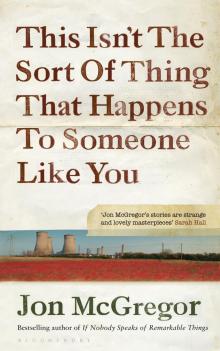 This Isn't the Sort of Thing That Happens to Someone Like You
This Isn't the Sort of Thing That Happens to Someone Like You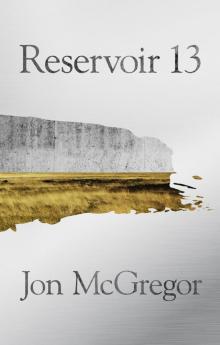 Reservoir 13
Reservoir 13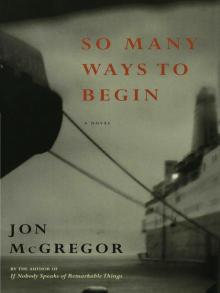 So Many Ways to Begin
So Many Ways to Begin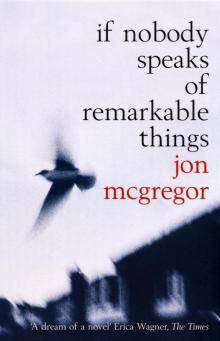 If Nobody Speaks of Remarkable Things
If Nobody Speaks of Remarkable Things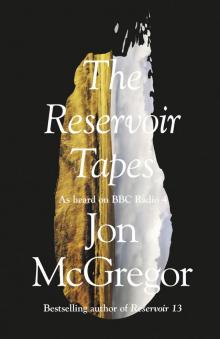 The Reservoir Tapes
The Reservoir Tapes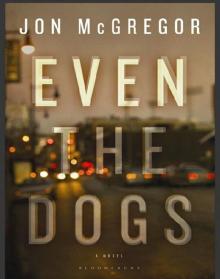 Even the Dogs: A Novel
Even the Dogs: A Novel